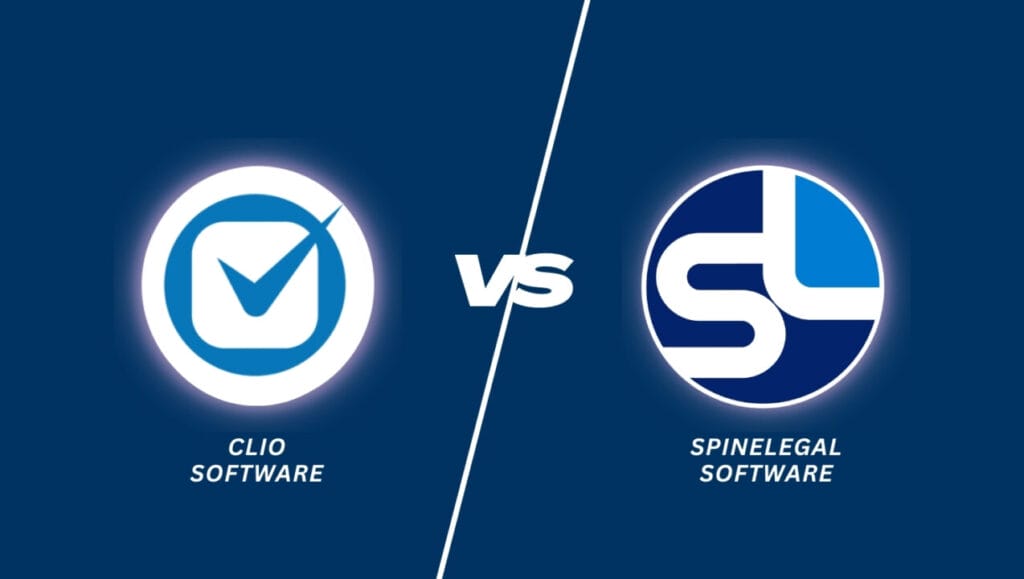Choosing the Right Legal Software for Your Firm
In the digital age, legal practice management software must do more than just track time and manage matters. Law firms are increasingly looking for customisable, scalable, and automation-rich platforms that adapt to their practice—not the other way around. SpineLegal and Clio are two leading platforms, but they cater to firms with different priorities and operational needs.
✅Clio is a widely known cloud-based solution that caters to small and mid-sized law firms, offering basic case and client management, time tracking, and billing functionality. Its ease of use and marketplace integrations make it appealing for firms looking for a setup with standard workflows.
✅ SpineLegal, on the other hand, is a fully configurable all-in-one legal software solution designed for firms that require workflow automation, document generation, compliance tracking, and deep configurability across multiple practice areas—including complex litigation, conveyancing, IP/trademark, and immigration.

Many firms using Insight Legal report that while the software is comprehensive, the complex user interface and outdated design slow down adoption, especially for growing teams. Additionally, the data structure is not designed for modern automation, making integrations and changes cumbersome.
In contrast, SpineLegal’s modern architecture is built from the ground up for agility, automation, and user experience. With everything centralised in the cloud, users can manage matters, track billing, generate documents, and maintain compliance from any device, without the need for steep technical onboarding.
| Feature/Capability | Clio | SpineLegal |
|---|---|---|
Platform Type | Cloud-based SaaS | All-in-one, cloud-native with on premises, private/hybrid options |
Workflow Automation | Basic task lists and reminders | Advanced – Customisable task stages, triggers, and case flows |
Custom Configuration | Low – Standardised structure and workflow | High – Tailored modules per firm’s processes |
Practice Area Support | General practice, basic matter types | Broad – IP, Immigration, Civil, Litigation, Conveyancing, Family, etc. |
Document Automation | Available via third-party integrations or Clio Draft | Integrated – Auto-generates documents with workflow linkage & templates |
Trademark & IP Data Integration | Not available | Yes – Direct access to UK, EU, and WIPO databases |
Client Intake & CRM | Basic – Lead management available via Clio Grow (extra module) | Built-in – Custom client onboarding forms, pipelines, and status tracking |
Compliance & Audit | Limited – Task and calendar-based reminders | Built-in – Deadline tracking, risk controls, audit logs |
Time Recording & Invoicing | Standard – Time tracking and billing features | Advanced – Timer, manual entries, fixed fees, invoice simulation |
Reporting & Analytics | Basic – Standard reporting dashboards | Real-time insights across cases, teams, and billing |
User Interface | User-friendly and clean | Modern, role-specific dashboards and navigational clarity |
Mobile App | Mature mobile app for basic case access | Cloud access from any device; support all devices |
Client Communication | Email integrations available; SMS requires third-party apps | Integrated email, SMS, secure document sharing portals |
Data Migration from Clio | Not applicable | Yes – Migration support available |
Support & Onboarding | Global support team; onboarding depends on subscription tier | Dedicated UK-based support team, personalised training, migration support |
Pricing Model | Subscription-based, fixed-tier pricing | Flexible – Based on usage, firm size, and features |
Clio excels in providing am out-of-the-box experience for general practice firms who want basic tools that “just work.” However, its rigidity becomes a limitation for firms with specialised workflows, compliance requirements, or advanced automation needs.
SpineLegal is designed for law firms that demand more from their technology—whether it’s custom workflows, embedded document generation, practice-specific templates, or direct integration with trademark/IP registries.
A managing partner shared, “We started with Clio but outgrew it. SpineLegal gave us automation, configurability, and insights that transformed how we operate.”
SpineLegal provides a structured data migration service for firms moving from Clio. The process includes:
a) Secure export and import of matters, clients, documents, and financial records
b) Mapping data into a custom SpineLegal setup to suit your workflows
c) User training and onboarding to ensure a seamless transition
For firms looking beyond basic case tracking and time recording, SpineLegal offers the depth, flexibility, and automation necessary to scale and specialise. From trademark management to litigation workflows, it adapts to your firm’s operations—rather than forcing you into a one-size-fits-all solution.
Book a tailored demo today to explore how SpineLegal can replace and improve on your current Clio setup.
Built for Simplicity, Security, and Scale
Yes. Our system is fully compliant with GDPR and other major legal frameworks. We offer data encryption, audit trails, and secure data storage.
Absolutely. SpineLegal integrates with your email, calendar, accounting software, and document management tools.
Our onboarding team ensures a smooth transition with complete data migration and staff training support.
No problem! SpineLegal is designed to scale with you. Add new users, modules, and offices at any time.
Not at all. Our cloud-based solution is fully managed by us, with 24/7 support and automatic updates.

©2026 All Rights Reserved. Created with SpineLegal